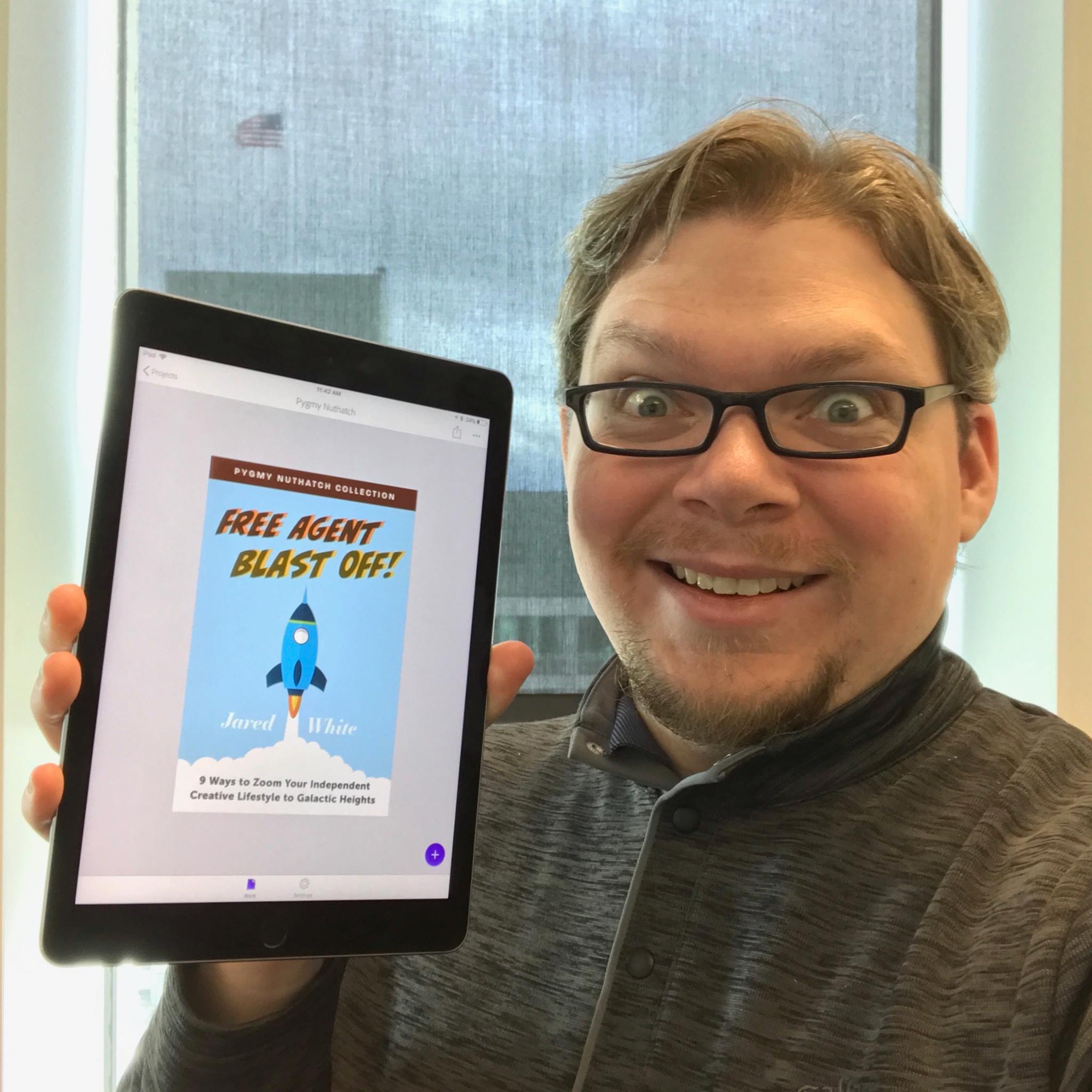Kicking off the new Pygmy Nuthatch video series, I present 3 keys to finding the ideal work environment for your free agent lifestyle.
Please like and subscribe to my YouTube channel for more actionable ways to supercharge your freelance career!
![]()
Get the latest articles from Pygmy Nuthatch—PLUS the chance to read excerpts from Free Agent Blast Off! before anyone else! Jared's upcoming book is action-packed with practical tips and insights into how to succeed as an independent creator.
Surround yourself with the things that inspire you: objects which mark the passage of time, trophies which remind you of your accomplishments, examples of what you wish to become and where you’re headed.
Display these things prominently, proudly. Dedicate a corner of your office. Turn your workspace into a creative refuge.
Imagine how pumped you would be when starting the work day if, instead of old Coke bottles, bills, and client artifacts greeting you, you beheld a tidy, uncluttered space nicely arranged with memorabilia and aspirational images of world travel, art, or office decor.
In order to achieve the life outcome you desire, you must visualize your future self. And it’s a lot easier to do that when the “vibe” surrounding your future self is part of your everyday now environment. We are naturally creatures of habit. Given a lack of thought, we will do the same things and go to the same places over and over again. By adding physical reminders of what you want to focus on, you shorten the distance between your reality and your destiny.
One of the main appeals of being an independent creative is that you never get unduly tied down to a project or an organization. When it makes sense to work on a project—the pay is good, the client is happy, the work is rewarding—you do so. When it comes time to move on, for whatever reason, you have the freedom to walk away (hopefully on good terms).
However, there are a few reasons why this isn’t always the case. Even free agents can fall into traps that will cause major problems down the road. Here are a few I’ve encountered along the way:
If you routinely work with other startups and solopreneurs, sooner or later this is going to happen to you. Instead of merely being content to remain your client, the company will try to recruit you to join them as a fellow founder. They’ll try to persuade you with elaborate stories of how they’re going to make it big and everyone in on the ground floor will get rich and famous.
Even if you refuse their offer and maintain your independent status as a consultant, they might offer you some amount of equity—in fact, if they try to talk down your standard consulting rate due to the equity you’ll receive, that’s a huge red flag. Always work for cold, hard cash. Always.
My firm conviction is that the only startup which should be able to recruit you as a founder and get you to leave your consulting practice is your own. You are the master of your own destiny. Don’t get mixed up in someone else’s dream.
Otherwise known as the Guilt Trip…you have a client you’ve worked with for a long time, but you feel like things with them have run their course. Maybe the kind of work you normally do has shifted, and they’re the only client left which requires the old approach. Maybe they have a limited budget and can’t afford your modern rates. Maybe working with them requires a lot of handholding, and you’re so busy on other critical projects it’d be easier just to drop them.
Whatever the reason, you know you really need to bid farewell and let them go, but you fail to do so out of guilt. Perhaps they’ve overtly said things to make you feel guilty, or perhaps that’s just how you feel because you’re nice like that. What you need to keep in mind is that a big reason why you went independent in the first place is so you could control your own work! If you find yourself feeling beholden to ill-fitting clients out of a sense of obligation (and not some sort of iron-clad contract), then you need to take a step back and reevaluate how you run your business. Ultimately you’re in this to make money and do work that you love, not to please everyone else but yourself.
This one’s a doozy. When you’re a consultant, it’s often a wise idea to try to find one or two “big clients” to provide the bulk of your income and supplement that with a bunch of smaller clients. If you only have a smattering of small clients and are constantly scrambling to find new ones just to make ends meet, that’s not a sustainable pace.
However, Trap #3 appears when you end up in a position where you have a single big client that takes up an inordinate amount of your time and owns an overwhelming share of your gross receipts. In addition, you may find that the style of work you provide for them is more along the lines of taking marching orders like any employee, rather than providing unique value as a consultant and a partner company.
It’s very tempting to maintain this type of client relationship if the pay is steady. After all, one of the big fears of going independent is that you’ll run into times when you hardly make any money, so if you can find a client that pays you good money frequently and regularly, that’s awesome, right?
Again, this requires a careful reevaluation of how you run your business. Any business with an unwholesome dependency on a single customer or a single supplier places the future health of that business in the hands of an outside entity. The top goal of running your own business is to find a solid place of self-sufficiency and income diversity. If your biggest client were to call you up tomorrow and tell you they’re dropping your contract, which of the following reactions would be yours?
Reaction #1: “Ah, bummer! I got a lot else going on though, so I’ll be fine,”
Reaction #2: “Oh my god, this is terrible! I’m doomed! DOOMED!!!”
If that second reaction hits home for you, then that’s proof you need to take major steps to restructure your client base and your work schedule.
In order to maintain your status as an independent creative, you need to have a healthy mix of income from client work and side-projects. Never get caught flat-footed. I must admit I’ve fallen into each one of these traps several times in the past. The good news is, if you recognize the trap you’re in early enough, you have the power to make the necessary changes to get back on track.
As a web designer and developer who works as a freelance consultant for clients, some might say I’m in the “boring” category of small business owner. Since I’m ultimately just a guy in a chair getting paid money for a service, big deal, right? I’m not in a garage building the next Apple or launching a Kickstarter for a new type of shaving cream or inventing a better DNA test which detects cancer. People just hand me money and I do some work in return. Who cares?
I think that philosophy is mistaken. Since when has getting paid to produce something excellent in a field in which you have real skill and talent “boring?” What’s wrong with making an honest living providing a valuable service that customers appreciate? If I’m not growing some hip startup by 10X every quarter, is that bad?
We need to get past the stereotypes of the frenzied entrepreneur moving to Silicon Valley and inventing the Next Big Thing or the digital nomad hipster working on a laptop on the beach sipping Mai-Tai’s. These sort of pop culture images of what it means to be an independent creative / solopreneur / free agent are not doing us any good, and in fact are holding us back from our true potential.
And that’s why I’m writing this book. Free Agent Blast Off! is a how-to guide for taking your “boring” freelance career and propelling it to new galactic heights. Meaningful success is often right around the corner, and sometimes all you need is a bit of thrust in the right direction.

Whether your business is a mix of various “side-projects” or you principally work for a couple of major clients, or whether you work in design, software, engineering, writing, or some other creative field, Free Agent Blast Off! will help you leap over common hurdles and take important steps forward towards your core objectives.
Wanna read a couple of chapters before the rest of the book is finished? All you have to do is sign up for the Pygmy Nuthatch newsletter and you’ll be golden. I’ll send those out to you as soon as I have them in hand!
![]()
Get the latest articles from Pygmy Nuthatch—PLUS the chance to read excerpts from Free Agent Blast Off! before anyone else! Jared's upcoming book is action-packed with practical tips and insights into how to succeed as an independent creator.
What are your outsized frustrations or hangups in your career as an independent creative? Let me know on Twitter!

Some people are highly social creatures and thrive in busy, interactive environments. Other people prefer to be lone wolves, zeroing in on “deep work” as advocated by Cal Newport.
It’s important to find a place of comfort within yourself regarding where you fall in that spectrum. If your job requires you to be surrounded by people who love to collaborate in groups and enjoy frequent office banter, but you just wish everyone would leave you the hell alone, then you’re going to be miserable. (Trust me, I know this first hand!)
Likewise, if your job often leaves you isolated and working by yourself, and you miss the feeling of solitary and teamwork that group workspaces offer, you will be equally unhappy. (I’ve heard stories of people who tried the work-from-home freelancer route, and ended up rejoining a company with an office because they liked working in a real-life space with colleagues around.)
If you’re not sure where you land between these two poles, I highly recommend you try every kind of work environment you can. Work at home. Work at coworking spaces. Work at coffee shops. Work at company offices. Find work you can do while traveling. (I strongly encourage you to try the “digital nomad” thing for at least a week or two!)
After a number of years of trying all of these different options (and feeling very fortunate I had the chance to do so), I’ve found that my sweet spot is working by myself at a coworking space, with a bit of travel around the local area each week. I like coworking spaces because you can work on your own projects undisturbed, yet you don’t feel like you’re turning into a troll staring at the walls in your own house every day. (Plus I have two small children, so getting deep work done when they’re around is nearly impossible!)
And the “bit of travel” is key for me—our family recently moved to the Portland, Oregon area, so there’s a lot to see and do here that is all new to me. The flexibility of heading out on little mini-trips at various times each week is why I love being a Free Agent. If I were chained to my desk 9 to 5 every day, I would simply wilt.
So how about you? What is your preferred work style? Are you a fan of solo endeavors? Do you like to move forward in a collaborative team environment? Do you like regular jumps between the two? Ask yourself these questions and you will level up to a new sense of productivity and satisfaction.